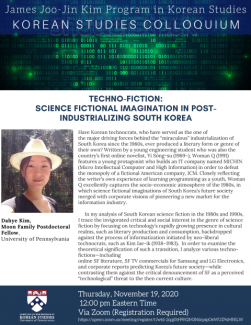Event

Have Korean technocrats, who have served as the one of the major driving forces behind the “miraculous” industrialization of South Korea since the 1960s, ever produced a literary form or genre of their own? Written by a young engineering student who was also the country’s first online novelist, Yi Sŏng-su (1969~), Woman Q (1991) features a young protagonist who builds an IT company named MICHIN (Micro Intellectual Computer and High Information) in order to defeat the monopoly of a fictional American company, ICM. Closely reflecting the writer’s own experience of learning programming as a youth, Woman Q excellently captures the socio-economic atmosphere of the 1980s, in which science fictional imaginations of South Korea’s future society merged with corporate visions of pioneering a new market for the information industry.
In my analysis of South Korean science fiction in the 1980s and 1990s, I trace the invigorated critical and social interest in the genre of science fiction by focusing on technology’s rapidly growing presence in cultural realms, such as literary production and consumption, backdropped against the process of informatization initiated by neo-liberal technocrats, such as Kim Jae-ik (1938~1983). In order to examine the theoretical signification of such a transition, I analyze various techno-fictions—including online SF literature, SF TV commercials for Samsung and LG Electronics, and corporate reports predicting Korea’s future society—while contrasting them against the critical denouncement of SF as a perceived “technological” threat to the then current culture.